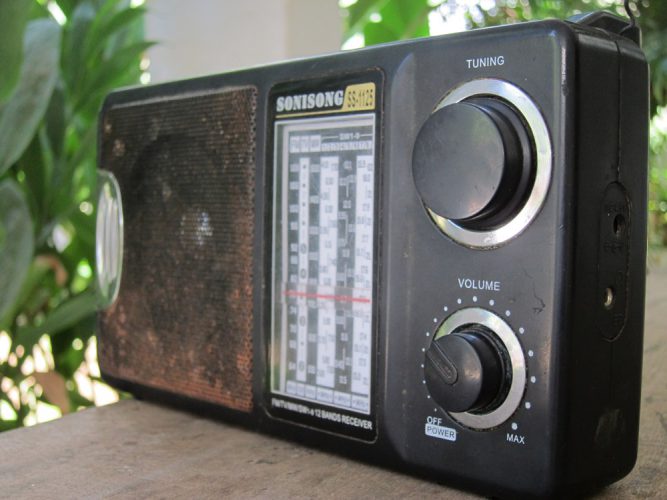The eastern region of Democratic Republic of Congo has recently experienced several crises: from a resurgence of Ebola and COVID-19, to the eruption of Mount Nyiragongo on May 22. Insecurity remains, including attacks by armed groups and mob justice.
Throughout, radio, newspapers and other media have an important role to play in supporting citizens and bringing communities together.
CORACON, a collective of community radio and television stations in North Kivu, documented how community radio stations responded in the wake of the eruption of Mount Nyiragongo. They were responsible for informing people on the evolving situation, including updates on the movement of displaced people, humanitarian assistance, and the spread of the lava.
Residents in 10 neighbourhoods in Goma were asked to evacuate on May 26 to avoid the lava flow. The Governor’s order was followed by massive displacement of people who moved to neighbouring towns. Many radio stations broadcast announcements for lost children to try to reunify families.
In some cases, radio production was affected as journalists or their families had to relocate. Stations relied on collaboration within their teams and from other radio stations in the region.
Read more from CORACON (available in French): https://coracondrc.com/2021/07/30/leruption-du-nyiragongo-quel-impact-pour-les-radios-communautaires/
Radio stations across DRC continue to share good information on COVID-19, including radio spots produced by Farm Radio International. Radio Tayna broadcasts key information several times a day in French and Swahili to keep their population informed as a third wave increases infection rates in Africa.
The station has been producing an interactive program in Swahili, called Najua Najikinga, since November, which allows listeners to ask questions to a health expert. From November 2020 to June 2021, they have had nearly 900 interactions from listeners, collected by SMS or the station’s Facebook page.
Daniel Makasi says “The interactive broadcasts were an opportunity for us to make room for listeners to find verified information during the health emergency.”
Stations in the region have also been addressing Ebola and tuberculosis, among other health topics.
They have also been involving youth in their programming. The Watoto Radio campaign, which included Radio Tayna and other stations in the North and South Kivu regions, gave youth access to the airwaves. Youth produced and broadcast programs on topics that interested them, including health, education, development, and local news.
During times when schools were closed because of COVID-19, the Watoto Radio campaign became a great learning and communication tool.
Learn more in this story in YenKasa Africa (in French): https://yenkasa.org/fr/watoto-radio-une-campagne-pour-faire-entendre-les-enfants-a-lantenne/
Dr Dénis Mukwege, human rights activist, Nobel Prize winner, and defender of women, is also calling for the media to be used as a tool for peace in the region. Recent incidents of mob justice has resulted in several deaths. Women, in particular, are a target, as mobs accuse them of witchcraft, burning them and demolishing their homes.
Dr Dénis Mukwege, who heads up the Panzi Hospital, called on the media to take over the fight against mob justice through broadcasts.
The women in media organization AFEM (Association des Femmes des Medias – Sud-Kivu) has also been active in working with journalists to address this phenomenon.
Learn more in this story in YenKasa Africa: https://yenkasa.org/nobel-peace-prize-winner-denis-mukwege-deplores-mob-justice-women-are-the-first-victims/


Comments are closed, but trackbacks and pingbacks are open.